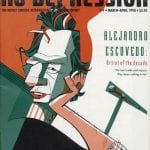Bonkers – Rusty tubes never sleep
In November 1997, the ever-changing subtitle below the No Depression logo read “The bimonthly for alternative countries”. Well, when it comes to playing country, alternative or not, countries probably don’t come more alternative than Norway.
Although Norwegian immigrants took part in the emerging American country scene as early as the 1930s (Slim Jim & The Vagabond Kid), American country music (or rock for that matter) has not seen too many Norwegian contenders. But the quartet Bonkers, hailing from Oppdal — Norway’s equivalent to Aspen, Colorado — is sneaking in through the back door. Their debut EP, Rusty Tubes, clearly proves that there are alternative geographical routes to alternative country.
Rusty Tubes has received strong reviews in national Norwegian newspapers, which is fairly unusual as the bigger papers rarely write about independently released CDs. The songs (sung in English) showcase a band with a surprisingly mature sound, connecting the mid-’80s Paisley Underground of Green On Red and Rain Parade with current standard-bearers Son Volt.
Led by singer, guitarist and keyboardist Gaute ien (a name destined for some interesting turns should the band start garnering press outside of Norway), the band adds pedal steel and occasionally fiddle to their harmony-drenched, distinct melodies. Beautifully catchy numbers such as “Mistress Naomi” and “When Life Comes Crashing” run freely between Adult-Alternative and Americana radio formats and likely would be firing up the jungle telegraph had the band come out of Festus, Missouri. Rounding out the five-song disc is the slightly Salvador Dali-inspired, seven-minute-long “Watch Without Dials”, a track that lets steel guitars and turbo-powered fuzz guitars crash with psychedelic effect.
“When I grew up I was exposed to the American rock of Bruce Springsteen and Tom Petty through a friend’s big brother, and that led to Warren Zevon,” ien says. (Zevon has a particularly strong following in Norway, and at one point even used Norwegian painter Edvard Munch’s internationally renowned painting “The Scream” as his tour symbol.) “There is also a blue tone to our music,” ien continues. “Our songs just come out as kind of sad.”
Like other bands adding country elements to rock, Bonkers also has to wrestle with the existential question of naming their particular sound, their style. “To me it comes down to good and evil,” ien concludes. “Whether it is country rock or No Depression doesn’t really matter. To my mind, there is nothing but good and evil music.”




